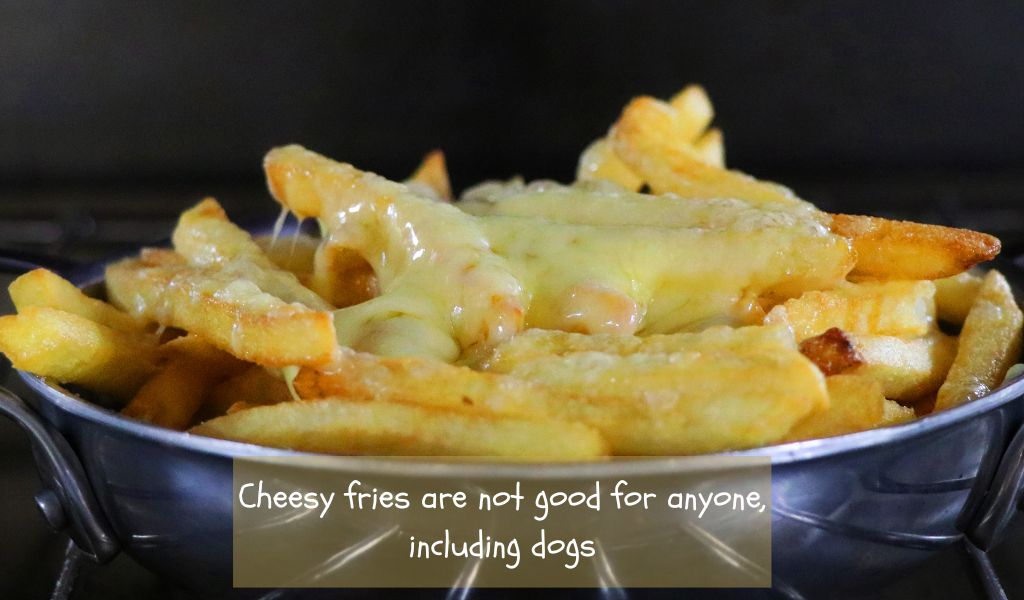French fries are a beloved snack around the world, and when you top them off with cheese, they become even more delicious. But can dogs eat cheese fries?
Before you give your pup some of your cheesy fries, let’s take a closer look at why these treats may not be the best choice for your four-legged family member.
In short, the answer to this question is no. Cheese should be avoided in dogs’ diets due to the lactose content, which can cause digestive issues like vomiting or diarrhea. Additionally, many cheeses are high in fat, which can lead to obesity and pancreatitis if consumed in large quantities. The same goes for French fries—they are high in fat, sodium, and calories and don’t provide any real nutritional value for your pup. Plus, they’re greasy and can cause stomach upset.
Foods that can harm dogs
French fries contain high amounts of salt and fat, both of which can be harmful to dogs if eaten in large quantities.
The problem is that dogs don’t have the same ability as humans to recognize when they’ve had enough.
So if you feed your dog too many cheese fries, their tiny bodies could be overwhelmed with unhealthy fats and sodium.
This could lead to digestive issues like vomiting or diarrhea, or even more serious issues like pancreatitis or obesity.
Cheese is also questionable for canines.
While small amounts of dairy products (like yogurt or cottage cheese) are generally safe for dogs, most cheeses are high in fat and salt content—and therefore should be avoided.
And processed cheeses like those often found on fast food french fries are especially dangerous because they contain artificial ingredients that can cause an upset stomach in dogs.
Risks of feeding your dog cheese and French fries
The primary risk associated with feeding your dog cheese or French fries is the calorie content.
Both cheese and potatoes are high in calories and fat – two things that should be monitored carefully when it comes to what you feed your dog.
Too much fat can lead to weight gain in dogs as well as other health issues such as pancreatitis.
Cheesy fries contain high levels of fat, salt and carbohydrate and can cause significant problems for dogs if they eat too many.
Additionally, too many carbs (as found in potatoes) can cause an imbalance in blood sugar levels which could lead to diabetes or other issues down the road.
Even though a few small pieces of plain French fries may be okay in moderation, adding cheese significantly increases the risk of digestive upset.
This is because cheese is high in fat and salt, both of which can cause problems for dogs.
And since French fries are already high in fat and salt themselves, adding cheese to the mix is like pouring gasoline onto a fire (for their stomach).
In addition to digestive upset, there are other health risks associated with feeding your dog foods high in fat and salt.
Foods like this can increase your pup’s risk of developing diabetes, obesity, and even heart disease down the line.
So even if they beg you for a couple bites of your delicious cheesy fries every now and then, it’s best to say no just to be safe.

Healthy alternatives
Fortunately, there are still plenty of snacks that you can share with your pup without any danger to their health.
For example, if you want something crunchy and salty, try baked sweet potato chips instead of regular French fries.
You can also make homemade peanut butter treats with just three simple ingredients that most people already have in their pantry, natural peanut butter (without any added sugar), one egg, and whole wheat flour.
Or whip up a batch of frozen banana bites by blending together some plain Greek yoghurt and ripe bananas, then pour the mixture into an ice cube tray and freeze it until solid.
All three of these options provide a delicious treat without any added salt or unhealthy fats.
Conclusion and final thoughts
As a rule of thumb, you should never give your pup French fries with cheese as a meal or snack.
Not only does this combination offer little nutrition for your pup but it can also put them at risk for digestive issues such as vomiting or diarrhea from the lactose content in cheese.
If you choose to give your dog hard cheeses like Parmesan on occasion, do so sparingly and always keep an eye out for any signs of distress after consuming them just in case.
All things considered though – stick with healthy snacks that are specifically designed for dogs – these will ensure that your pup stays happy and healthy.




